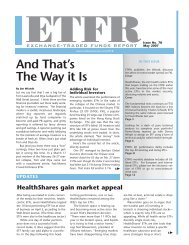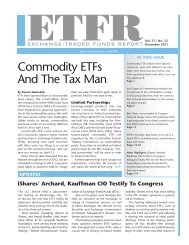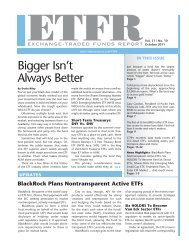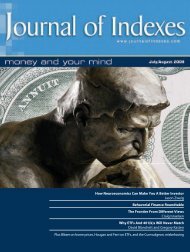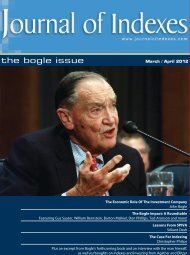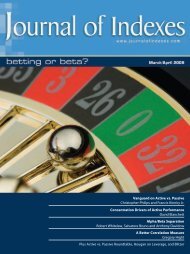US-Listed ETFs Sorted by Asset Class and Year-to-Date Return
US-Listed ETFs Sorted by Asset Class and Year-to-Date Return
US-Listed ETFs Sorted by Asset Class and Year-to-Date Return
You also want an ePaper? Increase the reach of your titles
YUMPU automatically turns print PDFs into web optimized ePapers that Google loves.
German <strong>ETFs</strong>: Now Or Never?<br />
By Paul Baiocchi<br />
When it comes <strong>to</strong> hunting for bargains<br />
in Europe in the past few years, all eyes<br />
have been on PIIGS, for better or worse.<br />
Portugal, Irel<strong>and</strong>, Italy, Greece <strong>and</strong> Spain<br />
have overshadowed more developed European<br />
nations in many inves<strong>to</strong>rs’ minds.<br />
But when the sovereign debt crisis boiled<br />
over last summer, inves<strong>to</strong>rs left the PIIGS<br />
behind <strong>and</strong> headed <strong>to</strong> Germany.<br />
As the continent’s largest <strong>and</strong> most dynamic<br />
economy, Germany holds much of<br />
the eurozone’s future in its h<strong>and</strong>s. During<br />
the summer meltdown, Germany’s status<br />
as the anchor of the eurozone meant any<br />
bailout plans had <strong>to</strong> be cleared <strong>by</strong> Berlin.<br />
The country proved incredibly resilient in<br />
the face of the global credit crisis, bouncing<br />
back from a 4.7 percent decline in<br />
GDP in 2009 <strong>to</strong> post a 3.6 percent rise in<br />
2010. Unlike its European brethren, Germany<br />
managed <strong>to</strong> keep unemployment<br />
below 10 percent even during the recession<br />
of 2008-09. In fact, Germany’s 7.4<br />
percent unemployment rate in 2010 was<br />
its lowest since reunification.<br />
Will Germany’s economy continue<br />
<strong>to</strong> power forward unabated? Or will the<br />
headwinds facing its economy, both internally<br />
<strong>and</strong> externally, overwhelm inves<strong>to</strong>r<br />
returns? While returns may not match<br />
those realized <strong>by</strong> inves<strong>to</strong>rs since the market<br />
bot<strong>to</strong>m, German-focused <strong>ETFs</strong> have significant<br />
positives in their favor right now.<br />
Currently, there are two <strong>ETFs</strong> that target<br />
Germany exclusively (see Figure 1):<br />
the well-established iShares MSCI Germany<br />
Index Fund (NYSE Arca: EWG), which<br />
launched in March 1996 <strong>and</strong> has nearly $3<br />
billion in assets; <strong>and</strong> the br<strong>and</strong>-new Market<br />
Vec<strong>to</strong>rs Germany Small-Cap ETF (NYSE<br />
Arca: GERJ), which launched in early April,<br />
just days before this issue went <strong>to</strong> print.<br />
A Bumpy Road Ahead?<br />
Despite its resiliency in recent times, the<br />
German economy is not without its warts.<br />
The German population is relatively old,<br />
with an average age of 44.9 years. This is<br />
a product of the country’s low birth rate<br />
as well as its low population growth rate,<br />
Will Germany’s<br />
economy continue<br />
<strong>to</strong> power forward<br />
unabated? Or will<br />
the headwinds<br />
facing its economy,<br />
both internally <strong>and</strong><br />
externally, overwhelm<br />
inves<strong>to</strong>r returns?<br />
both of which put Germany low in the<br />
global rankings, in the 17th percentile.<br />
More troubling, however, is the reliance<br />
of the eurozone on Germany. The<br />
sovereign debt issues of the eurozone<br />
have the potential <strong>to</strong> drag on the German<br />
economy, as any further bailouts<br />
will require significant German involvement.<br />
Not only do German banks have<br />
exposure <strong>to</strong> the sovereign issues of the<br />
PIIGS, but bailouts of its European counterparts<br />
would raise the specter of higher<br />
taxes, putting pressure on German consumers.<br />
Over 50 percent of German exports<br />
are <strong>to</strong> other European countries,<br />
making further economic turmoil in the<br />
region a significant risk <strong>to</strong> the continued<br />
prosperity of the German economy. A<br />
strong euro also makes German exports<br />
<strong>to</strong> the U.S. <strong>and</strong> China—which <strong>to</strong>gether<br />
currently receive over 14 percent of Germany’s<br />
exports—less competitive.<br />
As with virtually every country on<br />
the planet right now, Germany also has<br />
much <strong>to</strong> fear from inflation. German<br />
consumer prices have risen sharply in the<br />
first half of the year. The prices of all basic<br />
materials are on the rise, with the rise<br />
in the price of oil being exacerbated <strong>by</strong><br />
uncertainty in the Middle East. Because<br />
Germany has a daily deficit of over 2.5<br />
million barrels of oil <strong>and</strong> 81 billion cubic<br />
meters of natural gas, rising energy prices<br />
pose a significant economic threat <strong>to</strong><br />
company margins; specifically, iron <strong>and</strong><br />
steel producers. It should also be noted<br />
that Germany has very little <strong>to</strong> nothing<br />
in the way of domestic companies operating<br />
in the energy sec<strong>to</strong>r, meaning it is<br />
not only shelling out for things like natural<br />
gas <strong>and</strong> oil, it is not benefiting in any<br />
way from the rising prices.<br />
For inves<strong>to</strong>rs, these issues are likely <strong>to</strong><br />
impact newcomer GERJ more than the<br />
entrenched EWG; the small-cap fund has<br />
a far greater weight in the industrials <strong>and</strong><br />
consumer discretionary sec<strong>to</strong>rs at nearly<br />
50 percent of the fund, in addition <strong>to</strong> a<br />
negligible weighting in consumer staples<br />
(see Figure 2). Meanwhile, EWG’s collective<br />
weighting in those three sec<strong>to</strong>rs is less<br />
than 35 percent of its portfolio.<br />
The Good News<br />
Despite the potential pitfalls, Germany’s<br />
economy remains vital. The country<br />
boasts a highly skilled workforce <strong>and</strong> a<br />
literacy rate in excess of 99 percent. Seventy<br />
percent of the German economy<br />
comes from the service sec<strong>to</strong>r, bolstered<br />
<strong>by</strong> a reputation for tech-savviness <strong>and</strong><br />
the world’s most advanced telecommunications<br />
network.<br />
And despite their reliance on European<br />
buyers, the specific buyers—France,<br />
the Netherl<strong>and</strong>s, the U.K., Switzerl<strong>and</strong>,<br />
Belgium <strong>and</strong> Austria—are in much better<br />
shape than the faltering economies<br />
that make the headlines. Furthermore,<br />
Germany’s export growth <strong>to</strong> China has<br />
accelerated in recent years, as the world’s<br />
fastest-growing economy is now the<br />
country’s second-largest cus<strong>to</strong>mer.<br />
Tough Choices For Inves<strong>to</strong>rs<br />
The German economy has provided inves<strong>to</strong>rs<br />
with strong returns ever since the<br />
ETFR • May 2011 7




